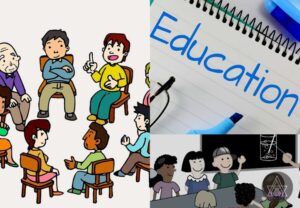Why Is Psychology Important For a Teacher Who Teaches Kindergarten Kids?
Introduction
The scientific study of human behavior and mental processes is known as psychology. It encompasses a wide range of topics and explores various aspects of human perception, emotions, motivations, perceptions, and interpersonal relationships. Psychologists seek to understand how individuals think, feel, and behave, both as individuals and in social settings.
Educational psychology is a subfield of psychology that focuses on how individuals learn and grow in educational contexts. It applies psychological principles and theories to study the cognitive, emotional, social, and behavioral aspects of the teaching and learning process. Educational psychologists work to improve educational practices, enhance learning outcomes, and support the well-being of students, teachers, and educational institutions. Psychology is of immense importance for a teacher who teaches kindergarten kids as it offers valuable insights into child development, learning processes, and effective classroom management strategies. Understanding the principles of psychology empowers teachers to create a positive and nurturing learning environment that enhances the overall educational experience for young children.
Psychology, the scientific study of human behavior and mental processes, plays a fundamental role in the field of education, particularly for teachers who work with kindergarten children. Early childhood education is a critical phase in a child’s development, where foundational skills, behaviors, and attitudes are formed. Understanding the principles of psychology provides teachers with valuable insights into the cognitive, social, emotional, and behavioral aspects of young learners, enabling them to create an optimal learning environment and facilitate holistic growth. In this Assignment, will explore the reasons why psychology is of paramount importance for teachers who teach kindergarten kids.

Importance of Psychology in Education
Psychology is highly significant in education because it plays a crucial role in improving teaching and learning procedure, increasing educational results, and promoting the overall well-being of students, instructors, and educational institutions.
Here are some of the main reasons why psychology is important in education:
Understanding Learning Processes: Psychology provides insights into how individuals learn, process information, and acquire knowledge. By understanding different learning styles and cognitive processes, educators can tailor their instructional methods to match students’ needs, promoting more effective learning experiences.
Identifying and Addressing Learning Difficulties: Educational psychologists help identify learning disabilities and challenges early on, allowing for timely interventions and appropriate support. They collaborate with teachers to implement strategies that address individual learning differences, ensuring that all students have equal opportunities to succeed.
Enhancing Teaching Strategies: Applying psychological research, educational psychologists can help teachers develop and implement effective teaching strategies that engage students and maximize their learning potential. Understanding how students process information can lead to the use of innovative and evidence-based instructional methods.
Motivation and Engagement: Psychology helps educators understand the factors that motivate and engage students in the learning process. By fostering a positive and supportive learning environment, teachers can increase students’ intrinsic motivation, leading to improved academic performance and a love for learning.
Social and Emotional Development: Educational psychologists focus on the social and emotional development of students. Educators may build a safe and supportive classroom atmosphere that improves students’ overall well-being and academic success by encouraging emotional intelligence, empathy, and interpersonal skills.
Classroom Management: Psychology offers effective classroom management strategies that help teachers maintain discipline, minimize disruptive behavior, and create a conducive learning environment. Positive behavior reinforcement and conflict resolution techniques contribute to a more harmonious classroom atmosphere.
Teacher Professional Development: Educational psychology informs teacher training and professional development programs, helping educators stay up-to-date with the latest research-based instructional methods and strategies.
Curriculum Design and Assessment: Psychology plays a role in designing curriculum content and assessments that align with students’ cognitive and developmental abilities, ensuring that the curriculum is both challenging and achievable.
Parent-Teacher Collaboration: Understanding the psychological factors that influence parent involvement and communication is crucial for building strong partnerships between parents and teachers. Collaborative efforts between parents and educators positively impact students’ academic progress and social development.
Promoting Lifelong Learning: Psychology fosters a deeper understanding of how individuals continue to learn throughout their lives. By encouraging a growth mindset and promoting self-directed learning, educational psychologists support the development of lifelong learners.
psychology’s importance in education lies in its ability to inform and enhance teaching practices, support individual student needs, promote a positive and engaging learning environment, and contribute to the overall success and well-being of students and educational institutions. By applying psychological principles, educators can create more effective and inclusive educational experiences that empower students to reach their full potential.

Psychology for the Kindergarten Teacher
Psychology is an important tool for kindergarten teachers because it affects their ability to understand and effectively teach young students. Psychology, with a focus on child development, provides instructors with useful insights on kindergarten children’s cognitive, social, emotional, and physical progress. This knowledge enables teachers to create age-appropriate activities and lessons that cater to individual characteristics, ensuring that each student’s unique requirements are satisfied. Furthermore, psychological principles help teachers establish a good and helpful learning atmosphere in the classroom. They learn how to encourage social and emotional growth in their students, how to communicate effectively with them, and how to use conflict resolution tactics. Kindergarten instructors can boost motivation and engagement by utilizing psychological research, making learning a delightful and meaningful experience for the young minds in their care. Finally, psychology enables kindergarten teachers to lay the groundwork for their pupils’ future learning and academic achievement.
Child Development
Kindergarten is an important stage in a child’s development because it establishes core cognitive, social, emotional, and physical skills. Psychologists have conducted substantial research on the stages of child development and the accompanying milestones that children attain at various ages. Teachers can customize their instructional tactics to fit the particular requirements of their pupils and provide developmentally appropriate learning experiences if they understand these developmental stages. For example, children’s brains are rapidly developing during the preschool years, and they learn best through play and hands-on experiences. Teachers that are well-versed in psychology can construct interactive and play-based activities that correspond with young learners’ cognitive skills, facilitating their growth and knowledge acquisition.

Individual Difference
Every kindergarten student is an individual with their own learning style, personality, talents, and challenges. In the classroom, psychology emphasizes the importance of identifying and respecting these individual variations. To effectively meet the unique needs of their pupils, teachers must differentiate their education and assistance. Educators can provide a pleasant and inclusive learning environment by using a variety of teaching methods, resources, and evaluations to ensure that each child receives an education that is tailored to their talents and interests.
Classroom Management
A well-managed classroom is essential for kindergarten kids to have a good learning experience. Classroom management approaches based on psychological concepts can assist teachers in maintaining discipline and creating an environment conducive to learning and cooperation. Understanding positive reinforcement-based behavior management tactics, for example, can foster positive behaviors in children, resulting in a more harmonious and focused classroom.
Learning and Memory
A kindergarten teacher must understand how children learn and retain information. Cognitive psychology provides insights into early learners’ memory processing, attention span, and cognitive capacities. Teachers can build engaging and relevant lessons that maximize the learning experience by incorporating this knowledge into their teaching techniques. Incorporating visual aids, narrative, and hands-on activities, for example, can improve children’s memory recall and understanding of subjects.

Social and Emotional Development
Kindergarten is an important stage in children’s social and emotional development. Psychologists have conducted substantial research on emotional intelligence, social skills, and empathy, all of which are necessary for healthy emotional development. A teacher who understands psychology can establish a supportive and nurturing environment that promotes emotional well-being. This setting promotes meaningful interactions, assists youngsters in developing self-awareness and self-regulation, and fosters empathy and respect for others.
Communication and Interaction
Effective communication skills are essential for any teacher, but they are especially important when working with young children who may not have fully developed language skills. Understanding psychological factors connected to communication and language development can help kindergarten instructors speak clearly and engage pupils effectively. Nonverbal clues, gestures, and visual aids become valuable instruments for improving classroom communication.
Problem Solving and Conflict Resolution
Children may confront disagreements or obstacles in their interactions with peers during kindergarten. Teachers with a psychology background can use suitable conflict resolution approaches and assist pupils in developing problem-solving abilities. This combination of abilities enables youngsters to resolve disagreements on their own, promoting a sense of autonomy and social competence.
Parent-Teacher Collaboration
Kindergarten teachers must effectively interact with parents in order to assist their children’s learning and development. Psychology can provide insight into family dynamics and the impact of parents on their children’s educational experience. Teachers may develop excellent partnerships with parents by knowing their different histories and needs, resulting in a complete support system for young learners.
Motivation and Engagement
Psychology can provide useful insights into the factors that inspire and engage children in the learning process. Teachers can utilize this information to create engaging and relevant activities that promote active participation and a love of learning. Teachers can increase motivation and general engagement among kindergarten students by introducing elements of gamification, hands-on learning, and personal interests into classes.
Now you can understand why is psychology important for a teacher who teaches kindergarten kids.
Conclusion
Finally, because of its enormous impact on early childhood education and the general development of young learners, psychology is critical for a kindergarten teacher. Teachers may create a good and caring learning environment, address individual differences, and build effective teaching strategies customized to the specific requirements of each child by understanding psychological principles. Psychology also prepares teachers to promote children’s social and emotional development, manage classroom behavior, and instill a love of learning in their students. Kindergarten instructors have a critical role in building the groundwork for their pupils’ future academic performance and emotional well-being by applying psychological understanding. Embracing psychology in their teaching practices enables educators to make a lasting and positive impact on the lives of young children, shaping them into confident, curious, and motivated learners.







A lot of what you point out happens to be supprisingly precise and it makes me wonder the reason why I had not looked at this in this light before. Your article truly did turn the light on for me as far as this topic goes. Nonetheless at this time there is just one point I am not too cozy with and while I attempt to reconcile that with the actual main theme of your position, permit me observe just what the rest of the subscribers have to point out.Very well done.
Hey, cool post You can check if there’s a problem with your website with Internet Explorer. Because of this issue, many readers will overlook your excellent writing because IE is still the most popular browser.
Your article helped me a lot, is there any more related content? Thanks!
Can you be more specific about the content of your article? After reading it, I still have some doubts. Hope you can help me.